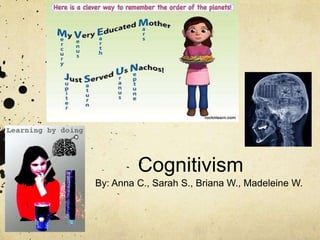
Cognitivism
- 1. Cognitivism By: Anna C., Sarah S., Briana W., Madeleine W.
- 2. The Theory Cognitivism: Cognitive Theory is an offshoot of traditional psychological concepts of thinking, deciding, and remembering. According to the cognitive theory, activities like thinking and remembering seem like a behavior, thus providing an avenue to use behavior analysis to measure their effect on learning. (Textbook) Key people associated with the theory: Allan Paivio – Developed dual coding theory. Robert Gagne – Developed 5 areas of learning outcomes, eight original multiple intelligence and technology integration and the nine events of instruction. Howard Gardner – Believed “that intelligence was the key to understanding how students learned” (textbook) Benjamin Bloom – Developed cognitive domain, affective domain and psychomotor domains to classify how students learned. Also developed the six
- 3. The Theory (cont.) Cognitive Theory is based upon how people understand materiel. It is based on aptitude and capacity to learn, learning styles, and it is also the basis of constructivism. (http://www.learningandteaching.info/learning/cognitiv e.htm) The cognitivist revolution replaced behaviorism in 1960s as the dominant paradigm. Cognitivism focuses on the inner mental activities – opening the “black box” of the human mind is valuable and necessary for understanding how people learn. Mental processes such as thinking, memory, knowing, and problem-solving need to be explored. Knowledge can be seen as schema or symbolic mental constructions. Learning is defined as change in a learner’s schemata. (http://www.learning- theories.com/cognitivism.html#more-34)
- 4. Classroom Implications for Teachers Integrate visuals, audio, props, verbal/nonverbal content, and give examples in lessons Create interesting and motivating lessons that engage students (can use the Nine Events of Instruction as a guideline ex. stimulating recall, providing feedback) Have students complete component tasks that lead toward a final task Adjust instruction and assessment based on students’ multiple intelligences and learning styles Include activities in lessons that support other
- 5. Classroom Implications for Teachers (cont.) Plan curriculum based on what students already know and what they should learn Give problem-solving scenarios and real-life contexts for learning Monitor students and assess changes in cognition and performance Establish a routine for students and provide instructional support (Examples without technology: oral instruction, books, songs, discussions) (Examples with technology: PowerPoint, video, SMART Board, projector, websites)
- 6. Classroom Implications for Students Develop knowledge and skills from simple to complex (hierarchical learning) Demonstrate learning outcomes in assignments (ex. intellectual skills, cognitive strategies) Have different learning styles and benefit from instruction associated with their multiple intelligences (ex. puzzles or playing Tetris for spatial-visual intelligence) Use background knowledge and organize ideas and thoughts Explore and be active in the learning process Practice learned information and elaborate by relating to other information (ex. making analogies) Master content from previous lessons, and then continue to gain knowledge and information
- 7. Classroom Implications for Students (cont.) Demonstrate competence through knowledge, comprehension, application, analysis, synthesis, a nd evaluation (Examples without technology: worksheets, board games, puzzles, flash cards, essays, experiments/projects) (Examples with technology: academic software, database and word processing software, computer games) Credits: Jordan, L. (n.d.). Cognitive strategies. Retrieved from http://www.specialconnections.ku.edu/?q=instruction/cognitive _strategies Shelly, G., Gunter, G., & Gunter, R. (2012). Teachers discovering computers: Integrating technology in a connected world. (7th ed.). Boston, MA: Course Technology: Cengage Learning.
- 8. What Do You Think About The Theory For Your Own Teaching? Using the cognitive theory as a learning theory in the classroom is something we as future educators plan to do. As teachers, we want to help our students develop the skills that will help them further their education and help them think in their everyday lives. We want our student’s to carry the information being taught to them forever, not just used for one assignment and forgotten the next day. Using Gagne’s Nine Events of Instruction will help set up a basic structure that will, as the book states, help our students “improve the internal process of learning”. Too often students are taught for a purpose of a grade, but the cognitive theory is a way to really allow the information to sink in.